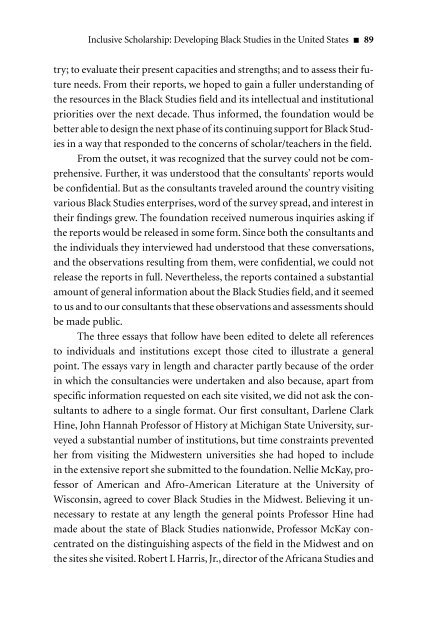Inclusive Scholarship: Developing Black Studies - Ford Foundation
Inclusive Scholarship: Developing Black Studies - Ford Foundation
Inclusive Scholarship: Developing Black Studies - Ford Foundation
You also want an ePaper? Increase the reach of your titles
YUMPU automatically turns print PDFs into web optimized ePapers that Google loves.
<strong>Inclusive</strong> <strong>Scholarship</strong>: <strong>Developing</strong> <strong>Black</strong> <strong>Studies</strong> in the United States 89<br />
try; to evaluate their present capacities and strengths; and to assess their future<br />
needs. From their reports, we hoped to gain a fuller understanding of<br />
the resources in the <strong>Black</strong> <strong>Studies</strong> field and its intellectual and institutional<br />
priorities over the next decade. Thus informed, the foundation would be<br />
better able to design the next phase of its continuing support for <strong>Black</strong> <strong>Studies</strong><br />
in a way that responded to the concerns of scholar/teachers in the field.<br />
From the outset, it was recognized that the survey could not be comprehensive.<br />
Further, it was understood that the consultants’ reports would<br />
be confidential. But as the consultants traveled around the country visiting<br />
various <strong>Black</strong> <strong>Studies</strong> enterprises, word of the survey spread, and interest in<br />
their findings grew. The foundation received numerous inquiries asking if<br />
the reports would be released in some form. Since both the consultants and<br />
the individuals they interviewed had understood that these conversations,<br />
and the observations resulting from them, were confidential, we could not<br />
release the reports in full. Nevertheless, the reports contained a substantial<br />
amount of general information about the <strong>Black</strong> <strong>Studies</strong> field, and it seemed<br />
to us and to our consultants that these observations and assessments should<br />
be made public.<br />
The three essays that follow have been edited to delete all references<br />
to individuals and institutions except those cited to illustrate a general<br />
point. The essays vary in length and character partly because of the order<br />
in which the consultancies were undertaken and also because, apart from<br />
specific information requested on each site visited, we did not ask the consultants<br />
to adhere to a single format. Our first consultant, Darlene Clark<br />
Hine, John Hannah Professor of History at Michigan State University, surveyed<br />
a substantial number of institutions, but time constraints prevented<br />
her from visiting the Midwestern universities she had hoped to include<br />
in the extensive report she submitted to the foundation. Nellie McKay, professor<br />
of American and Afro-American Literature at the University of<br />
Wisconsin, agreed to cover <strong>Black</strong> <strong>Studies</strong> in the Midwest. Believing it unnecessary<br />
to restate at any length the general points Professor Hine had<br />
made about the state of <strong>Black</strong> <strong>Studies</strong> nationwide, Professor McKay concentrated<br />
on the distinguishing aspects of the field in the Midwest and on<br />
the sites she visited. Robert L Harris, Jr., director of the Africana <strong>Studies</strong> and

















